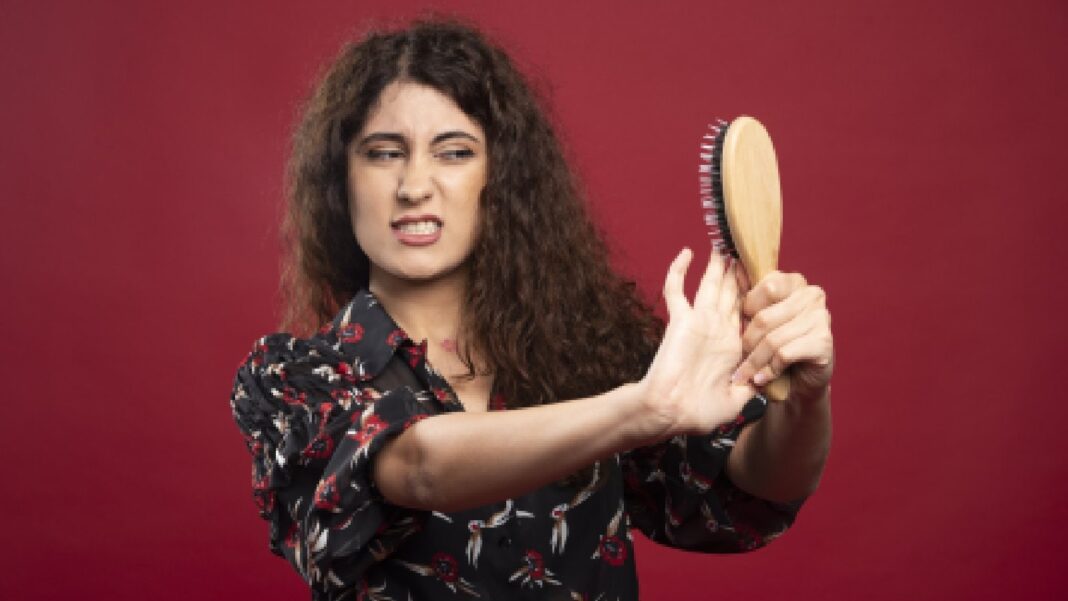Melatonin, a hormone found naturally in our body, regulates our sleeping and waking cycles. So, how is it connected to hair growth? We tell you all about melatonin for hair growth.
Hair loss can be due to hygiene issues, genes, hormonal imbalance or frequent use hot tools to style tresses. There are multiple causes of hair loss, and so are its solutions. Melatonin is considered to be an effective hair growth substance. It is a natural sleep hormone, which may also be beneficial for your hair. It can be consumed and applied topically. We asked an expert about the efficiency of melatonin for hair growth and how to use it.
What is melatonin?
Melatonin is a naturally occurring hormone that is produced by the pineal gland in the brain. This hormone plays a crucial role in regulating the circadian rhythm, which is essentially the body’s internal clock that dictates sleep-wake cycles. Beyond its primary function in sleep regulation, melatonin has several other significant roles. It possesses antioxidant properties, which means it can neutralise harmful free radicals in the body. So, it can protect cells from oxidative stress and potential damage, says dermatologist Dr Rashmi Aderao.

Due to its role in sleep regulation, melatonin is commonly available as a dietary supplement. It is particularly popular for managing sleep disorders such as insomnia and for alleviating jet lag, which can disrupt normal sleep patterns.
How does melatonin help with hair growth?
The topical application of a cosmetic melatonin solution can be used in the treatment for androgenetic alopecia, which is a common form of hair loss, as per a 2012 research published in the International Journal of Trichology. Melatonin has shown promise in the treatment of hair loss due to its multifaceted properties, particularly its potent antioxidant effects, says the expert.
Hair loss can be exacerbated by oxidative stress, where free radicals cause damage to hair follicle cells, leading to premature hair loss and weakening of the hair structure. Melatonin’s antioxidant properties help mitigate this damage by neutralising free radicals. So, it protects hair follicles from oxidative stress. This protective action reduces hair damage and loss, preserving hair health.
Another significant way melatonin aids in combating hair loss is by influencing the hair growth cycle. Hair follicles go through different phases — the growth phase (anagen), the transitional phase (catagen), and the shedding phase (telogen). Melatonin may extend the anagen phase, meaning hair remains in the growth phase for a longer period. This reduces the frequency of hair entering the shedding phase, leading to increased hair density and less hair loss, explains Dr Aderao.
In conditions like androgenetic alopecia, where hair loss is influenced by androgens (male hormones), melatonin acts as an antiandrogen. It modulates androgen receptors on hair follicles, reducing the impact of androgens on hair loss. Also, melatonin affects the aromatase enzyme, which converts androgens to estrogens. It influences hormonal balance in favour of hair preservation.

How to use melatonin for hair?
Melatonin supplements are available, but for hair growth, it is typically used in topical formulations such as serums, and lotions. These products are designed for direct application to the scalp. Select a topical melatonin product that is specifically formulated for hair application. Apply the melatonin solution directly to the scalp, focusing on areas experiencing thinning or hair loss. Use the applicator provided with the product or your fingertips to distribute the solution evenly. Gently massage the scalp for a few minutes to ensure that the melatonin is well absorbed into the scalp and reaches the hair follicles.
You can use topical melatonin once daily for several months. The optimal time for applying melatonin is in the evening, aligning with the body’s natural melatonin production cycle, says the expert. This can enhance the effectiveness of the treatment and promote better absorption.
What are the side effects of using melatonin for hair?
Melatonin is generally considered safe, especially when used topically for hair health. However, like any supplement or treatment, it can cause side effects in some individuals.
Select Topics of your interest and let us customize your feed.
- One of the most common side effects associated with topical melatonin use is scalp irritation. You may notice redness, itching, or a burning sensation at the site of application. Such reactions are typically mild and resolve on their own, but if they persist or become severe, go to a doctor.
- Allergic reactions are another potential side effect, although they are relatively rare. You may have skin rash, swelling, or find it difficult to breathe.
- People with certain medical conditions or those taking other medications should use melatonin with caution. For instance, people with autoimmune diseases, hormone-related cancers, or those on medications that affect the immune system should consult their doctor before using melatonin. Pregnant or breastfeeding women should also seek medical advice before starting melatonin.
You can topically use melatonin for hair growth, but follow the application instructions to avoid side effects. You also need to follow a hair care routine and eat a healthy diet rich in vitamins and minerals essential for hair health.








